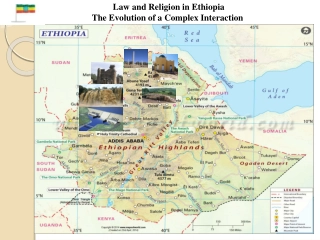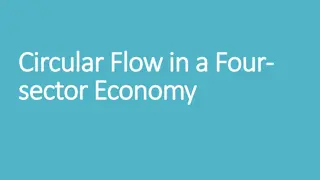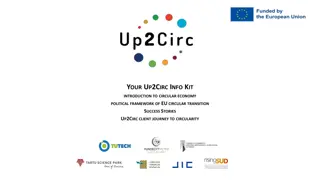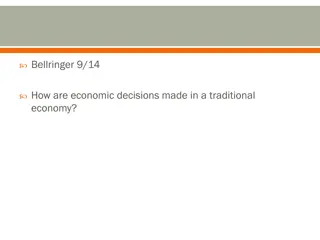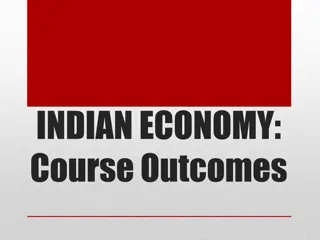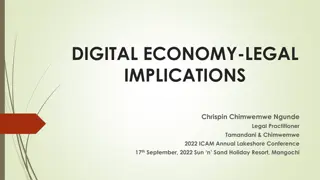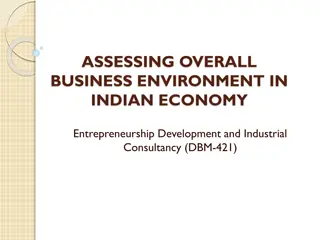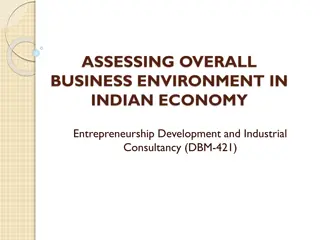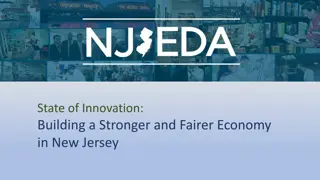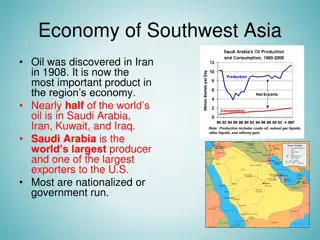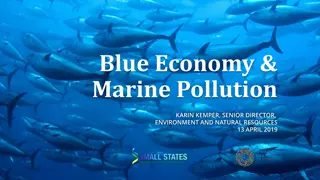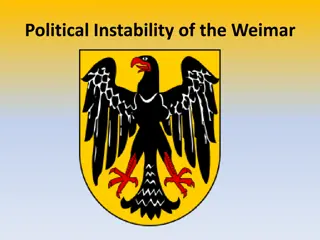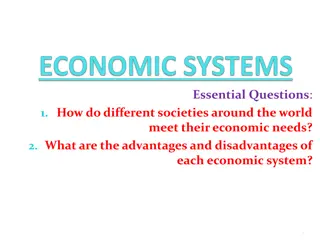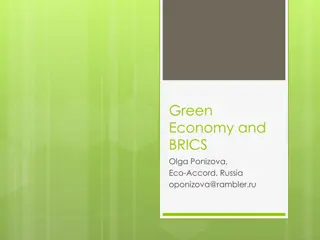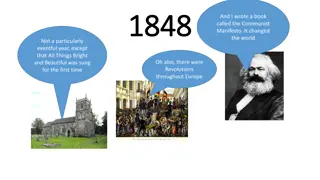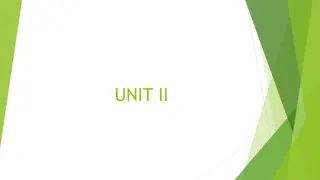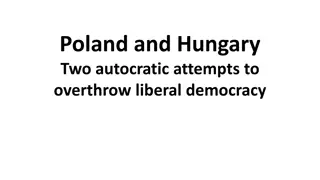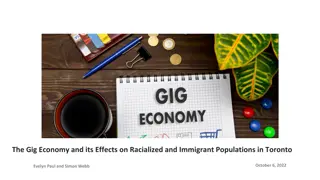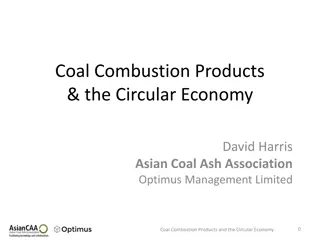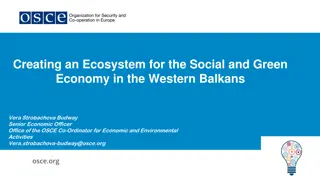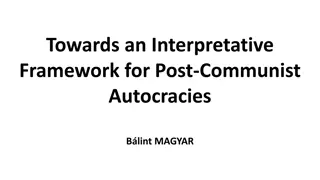Sustainability and the Blue Economy Concepts
The intertwining concepts of sustainability and the blue economy, focusing on historical developments, environmental protection events, and the emergence of sustainability science. Discover the pillars supporting a sustainable blue economy and pathways for inclusive development.
15 views • 40 slides
Law and Religion in Ethiopia: A Historical Overview
Explore the evolution of the complex interaction between law and religion in Ethiopia, from Imperial Ethiopia to the Communist Era and the post-communist period. Discover the rich historical origins of Ethiopia, including its diverse religious landscape and unique governance structures. Delve into t
0 views • 28 slides
Circular Flow in a Four-Sector Economy Explained
The circular flow in a four-sector economy involves households, firms, government, and the foreign sector. Each sector plays a crucial role in money flows and payments, contributing to the continuous flow of income. The financial market also has a significant impact on the economy by accumulating sa
3 views • 8 slides
Glossary of Key Terms
Explore essential terms in economics such as command economy, consumer, demand, economic system, free enterprise system, goods, innovation, market economy, marketplace, mixed economy, needs, producer, profit, resources, scarcity, services, supply, technology, trade-off, traditional economy, and want
3 views • 6 slides
Accelerating Towards a Circular Economy Future
The circular economy presents a vital solution to tackle climate change by focusing on regenerative growth, reducing resource consumption footprint, and enhancing material use efficiency. The EU's Circular Economy Action Plan aims to usher in a sustainable future through decoupling economic growth f
2 views • 19 slides
Leveraging Non-Oil Exports for Nigeria's Blue Economy Growth
Nigeria Export Promotion Council (NEPC) focuses on diversifying Nigeria's economy by promoting non-oil exports for sustainable growth. The Blue Economy concept involves sustainable use of ocean resources for economic development. Nigeria's abundant ocean resources such as maritime transportation, fi
0 views • 20 slides
Economic Systems in the United Kingdom, Germany, and Russia
Economic decisions in traditional economies are based on customs and beliefs. The United Kingdom has a mixed market economy with a focus on service industries, while Germany's economy is export-based. Russia's economy leans towards a command system. By comparing these economic systems, one can see h
0 views • 11 slides
Understanding Indian Economy: Course Outcomes and Resources
Explore the course outcomes of the Indian Economy, covering economic development, policies, population growth, planning, agriculture, Kerala's economy, and resources for further study. Access government data and publications on the Indian economy for comprehensive learning.
0 views • 9 slides
Advancing Circular Economy Through Flexible Packaging Initiative
Flexible Packaging Initiative is driving a circular economy in Europe by emphasizing the importance of flexible packaging, showcasing key benefits, and outlining steps to ensure circularity in the recycling value chain. The initiative supports harmonized sorting labels, eco-modulated fees, and the p
5 views • 5 slides
Legal Implications of the Digital Economy in Malawi
Explore the legal implications of the digital economy in Malawi as discussed at the ICAM Annual Lakeshore Conference. Topics include the Electronic Transactions and Cyber Security Act, principles of implementation, Malawi CERT, data privacy, and the significance of the digital economy in transformin
0 views • 44 slides
Understanding Circular Flow in a Two-Sector Economy with Financial Market
In a two-sector economy with a financial market, households and firms engage in savings, investments, and borrowing through the financial market, unlike the simple circular flow assumption where no savings are made. This interaction between households, firms, and the financial market plays a crucial
0 views • 4 slides
Overview of Modern Business Environment in Indian Economy
Modern business in the Indian economy is characterized by large size, oligopolistic nature, diversification, global presence, technology orientation, and changing government regulations. The Indian economy features a mixed economy with both private and public enterprises, low per capita income, uneq
0 views • 14 slides
Overview of Business Environment and Economy in India
Business environment in India encompasses a mix of large, oligopolistic, diversified, and technologically oriented enterprises. The Indian economy is characterized by a mixed economy, low per capita income, and limited entrepreneurial potential. External and internal factors influence business opera
0 views • 14 slides
Insights into India's Thriving Gig Economy and Future Work Trends
India's gig economy, spearheaded by initiatives like IWWAGE, is reshaping the future of work, particularly for women. Key questions revolve around the gig economy's impact, legislative frameworks, and COVID-19 repercussions. Academia investigates the rise of gig work, focusing on platforms like Uber
0 views • 11 slides
Transforming New Jersey's Economy for Growth and Equality
New Jersey aims to revitalize its economy by focusing on key goals for 2025, including driving job growth, increasing wages, fostering diversity in STEM fields, erasing gender and racial wage gaps, and reducing poverty in urban centers. The plan involves investing in people, communities, innovation,
3 views • 5 slides
Strategic Creativity in Tourism Business: Unleashing Innovation and Growth
Explore the dynamic landscape of strategic creativity in tourism business through the lens of the experience and attention economy. Discover how creativity-based approaches can reshape planning and generate novel opportunities in the tourism sector. Delve into the concepts of the experience economy,
5 views • 14 slides
Economy of Southwest Asia: Oil, OPEC, and Cultural Influences
Oil discovery in Southwest Asia transformed the region's economy, with OPEC playing a key role in pricing. Primary products like oil and secondary goods influence the economy. Islam shapes the culture, while debates on Westernization persist.
1 views • 10 slides
The Blue Economy and Marine Pollution: A Comprehensive Overview
The presentation outlines the thriving ocean economy, the concept of the Blue Economy, the World Bank's approach, risks faced by oceans, and the impact of marine pollution on Small Island Developing States and coastal regions. It emphasizes sustainable development of oceanic activities, collaboratio
1 views • 12 slides
Understanding Globalization's Impact on the Economy
Globalization is the increasing unification of the world's economy, leading to greater interconnectedness and interdependence among nations. It has facilitated the exchange of products, services, and ideas globally, impacting economies worldwide. While it offers benefits such as increased productivi
0 views • 10 slides
Political Instability of the Weimar Republic: Spartacist and Kapp Putsches
The Weimar Republic faced political instability due to uprisings like the Spartacist and Kapp Putsches, rooted in dissatisfaction with its surrender to the Allies, weak constitution, and failure to address food shortages. The Spartacist Rising of January 1919, led by figures like Karl Liebknecht and
3 views • 18 slides
Consumer Protection in the Digital Economy: Challenges and Solutions
Exploring the relevance of consumer protection in the digital economy, this content delves into defining the digital economy, top countries in retail internet sales, and initiatives like the CARICOM Model Consumer Protection Bill. It addresses issues of jurisdiction in cross-border transactions and
0 views • 9 slides
Understanding Economic Systems and Their Impacts on Societies
Explore how different societies meet their economic needs through traditional, free enterprise, and communist economic systems. Learn about the advantages and disadvantages of each system, from the customs-based decisions in traditional economies to the government-controlled operations in communist
2 views • 17 slides
Insights into Social Economy and Social Dialogue Research Outcomes
Research outcomes from the Mesmer+ project at HIVA KU Leuven reveal misalignments in social dialogue inclusiveness, challenges faced by social economy entities, and the role of employers in the social economy. Recommendations include enhancing the role of social economy employers and promoting inclu
1 views • 7 slides
Exploring the Green Economy and BRICS Cooperation
The discussion focuses on the importance of the green economy for BRICS nations, suggesting ways for collaboration, especially in addressing climate change and transitioning to a low-carbon economy. The BRICS countries play a crucial role in global stability and sustainable development. Features of
0 views • 22 slides
Exploring National Identity and Revolutionary Ideals in European History
In this discussion, we delve into Karl Marx's beliefs in the Communist Manifesto, the lack of Communist revolutions in the 19th century, the role of national identity in societies, and the concept of imagined communities as outlined by Benedict Anderson. Through analyzing historical events and schol
2 views • 10 slides
The Cold War Expansion and Nuclear Arms Race
The Cold War intensified as the Soviet Union detonated an atomic bomb, leading to heightened tensions. Communist advancements, including the takeover of communist China, shocked the world. Nuclear arsenals expanded with the development of the hydrogen bomb, sparking concerns of an arms race. Eisenho
0 views • 17 slides
The Rosenberg Trial and the Red Scare: Cold War Espionage and Anti-Communist Hysteria
The Rosenberg Trial during the Cold War era exemplified the heightened tensions of the time, showcasing accusations of espionage, Communist subversion, and anti-American sentiment. Julius and Ethel Rosenberg faced allegations of passing atomic secrets to the Soviet Union, amid a backdrop of fear and
0 views • 14 slides
The Impact of Pandemics on the Shadow Economy Performance
Pandemics have a significant impact on the shadow economy, influencing the legal economy in various ways. The shadow economy serves as a buffer for high unemployment rates and can contribute to budget revenues through legal spending. Studies suggest that a growing shadow economy may reflect dissatis
0 views • 12 slides
Evolution of Services Marketing in the Modern Economy
The shift towards a service economy has transformed marketing practices, leading to the emergence of Services Marketing as a distinct discipline. This evolution highlights the unique characteristics of services, such as intangibility and simultaneous production-consumption. The 1980s mark a pivotal
0 views • 13 slides
Social Entrepreneurship in the Czech Republic: Roots, Development, and Current Status
Roots of social entrepreneurship in the Czech Republic trace back to solidarity values pre-transition to a market economy. Suppressed under communist regimes, resurgence post-transition faced challenges due to lack of institutional framework. Presently, the Czech Republic lacks specific legislation
0 views • 13 slides
Comparing Autocratic Attempts in Poland and Hungary
Poland and Hungary exhibit common ideological frames in their autocratic attempts, focusing on regime change rather than government shifts. These attempts utilize ethnonationalism, Euro-skepticism, and xenophobia to justify their actions. The two countries also showcase different types of post-commu
0 views • 15 slides
The Impact of the Red Scare and McCarthyism on American Society
The Cold War era saw the rise of the Red Scare and McCarthyism in America, fueled by fears of Communist infiltration. The loyalty review program, House Un-American Activities Committee, and infamous cases like Alger Hiss and the Rosenbergs reflect the intensity of the anti-Communist hysteria. Joseph
0 views • 12 slides
The Red Scare and Anti-Communist Hysteria in Post-World War II America
Americans in the post-World War II era were gripped by fears of communism, leading to the Red Scare and intense anti-communist sentiment. This period saw the rise of initiatives like the Loyalty Review Board and the House Committee on Un-American Activities, which targeted suspected communists in va
0 views • 16 slides
Understanding the Impact of the Gig Economy on Marginalized Groups in Toronto
This report delves into the effects of the gig economy on racialized and immigrant populations in Toronto. It outlines research findings, stakeholder insights, and strategic recommendations to address the challenges faced by marginalized groups in the gig economy. The study aims to shed light on the
0 views • 25 slides
The Learning Consortium for the Creative Economy Webinar Summary
The webinar on The Learning Consortium for the Creative Economy discussed key topics such as agenda details, presenters' backgrounds, poll results, and insights on the Creative Economy and its importance. Participants engaged in discussions on topics like the Recap on the Creative Economy, Scaling o
0 views • 43 slides
Coal Combustion Products & the Circular Economy - Addressing Resource Flow Challenges
This discussion delves into the intersection of coal combustion products and the circular economy, emphasizing the need for continuous re-evaluation of resource chains, ecosystem metabolisms, and industrial innovations to ensure sustainable environmental practices and economic growth. Exploring the
0 views • 24 slides
A Brief History of Communism: From Capitalism to Karl Marx's Vision
The history of communism traces back to the capitalist system's exploitation of workers in the mid-1800s. Karl Marx's vision, outlined in "The Manifesto of the Communist Party," aimed for economic equality and worldwide revolution. The inherent flaws of capitalism were critiqued, leading to the rise
0 views • 17 slides
Economic Transition in Post-Communist Countries: A Quarter Century Review
This presentation by Oleh Havrylyshyn explores the progress and performance of post-communist economies since the fall of the Berlin Wall in 1989. It compares different countries' approaches to marketization, privatization, economic performance, and political transformation. The analysis highlights
1 views • 28 slides
Advancing Social and Green Economy in Western Balkans
Creating an ecosystem for social and green economy in the Western Balkans is crucial for fostering peace, reducing disparities, and promoting sustainable business models. Initiatives like promoting innovation, job creation, and skills development among young entrepreneurs are key to driving growth a
0 views • 7 slides
Framework for Understanding Post-Communist Autocracies
The illusion of linear progress towards liberal democracies post-1989-1990 revolutions is challenged by the complex reality of post-communist autocracies. This framework explores the characteristics of democracy, autocracy, and dictatorship to categorize regimes, highlighting the challenges and nuan
0 views • 41 slides

